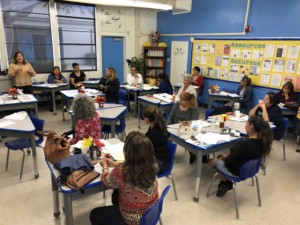The First Step in Engaging Parents is Getting to Know Them

By Murray Woodard
This blog was originally posted on EDinsight.
Parents and families are essential stakeholders in improving education outcomes for students. This isn’t breaking news. In fact, it’s something those of us working in education have known for some time.
A 2002 report from Southwest Educational Development Laboratory titled A New Wave of Evidence concluded, “when schools, families, and communities work together to support learning, children tend to do better in school.” Recently, California State PTA President Justine Fischer wrote in a Sacramento Bee article, “Decades of research have confirmed that students whose parents are active participants in their learning have significantly better school and life outcomes.” Yet today, many educators and administrators cite lack of parent engagement as a major contributor to underperforming schools and districts.
I would argue that the major contributor to this perceived lack of engagement is the disconnection between schools and the families they serve.
Countless educators gauge parent and family involvement by interactions like parent teacher conferences. To them, an “engaged parent” is one that shows up to the school on demand to discuss a previously arranged topic and then departs before the next parent arrives to do the same.
This is an awfully antiquated notion of parent involvement that seems more school- and teacher-centric than student-success focused. It relies heavily on the assumption that most students live in a two-parent household, where at least one adult has a job that allows them freedom and flexibility to attend such school meetings. This is somewhat understandable, given the conservative lens on the traditional family structure of which our current education system views parents.
The problem is that by this definition, many of today’s concerned adults would not meet the minimum threshold to be deemed an engaged parent or family member. Once a group is labeled disengaged, it is easy to fault them for not having a seat at the table. They are flawed, rather than the system.
Fischer, discussing a recent California State bill aimed at addressing this issue, acknowledged, “simply making family engagement the law doesn’t help school districts engage all parents, from all backgrounds, in all languages.”
Dr. Kimberly McLeod, professor at Texas Southern University and president-elect of Texas Alliance of Black School Educators, wrote in a recent blog post, “culturally conscious teachers know that to understand their students, they must first know their students.” The same should be said for education institutions and agencies about the communities and families in which they serve. I think that if one is sincere in their desire to understand and engage parents and families of the children they are educating, then they must first get to know them.
Once you get to know the families, you will recognize the need to broaden the definition of engagement to meet the needs of the families being served. Schools and education agencies must rethink how they involve families and the types of opportunities they provide for them to be a part of their child’s education process. I’m not advocating for the establishment of a one-size-fits-all approach to parent and family engagement. What I am advising is that schools actually work with parents and families to design an approach that’s best for the individual school, the parents and families within and the respective community they serve.
There is a promising local effort, resulting from Great Schools Visits discussions, to confront this very issue in Kansas City. This group was convened by a local father and the Executive Director of St. Mark Child & Family Development Center. Their first meeting was held in May and included concerned parents, educators, community organizations, and residents. The goal is that this is the beginning of a movement to create more meaningful engagement of parents and families in Kansas City area schools. In my humble opinion, this is a huge step in the right direction.
Please share your successful examples of parent and family engagement, within your community or school, in the comment section below or via social media using #KCGreatSchools.
For more, see:
- Visiting Schools: Transformative Professional Learning
- Do You Have A Blended Learning Department? You Should
- Smart Parents: Parenting for Powerful Learning
Stay in-the-know with all things EdTech and innovations in learning by signing up to receive the weekly Smart Update.





Martin Sumichrast
Hi @Murray Its an amazing post. I like the ways you have suggested. Great post.
Cheers!